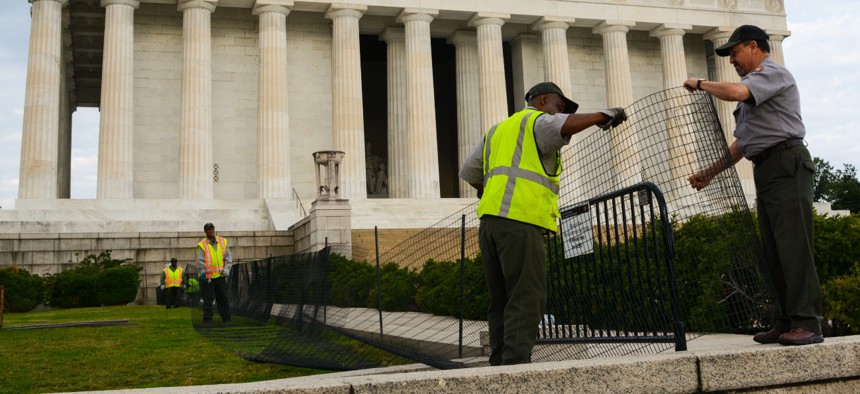The path to averting a shutdown is still unclear, with just days until the deadline

The Lincoln Memorial is closed off during the October 2013 shutdown. Scott Kirkwood/NPCA
The Senate is set to vote on a continuing resolution Tuesday that would fund agencies for 10 more weeks, but includes provisions many lawmakers oppose.
This story was updated at 4:15 p.m. with comment from Senate Minority Leader Mitch McConnell, R-Ky.
The Senate is set to cast its first in a series of votes for a funding bill on Tuesday to keep agencies afloat through Dec. 16, though the prospects for passage in its current form are dim.
The continuing resolution, which would keep the government open past the Friday evening expiration of current appropriations, includes a controversial measure to speed up the permitting process for some major energy projects. Republican leadership has said it will not support the CR with that language included, and a handful of Democrats have said the same. Still, when lawmakers unveiled the bill late Monday, it included the permitting language.
Senate Majority Leader Chuck Schumer, D-N.Y., had promised to put the energy project changes into the CR as part of an agreement he struck this summer with Sen. Joe Manchin, D-W.Va., to win his support for the Inflation Reduction Act.
The roughly 10-week spending bill would keep agencies funded at their current levels into the lame duck session of Congress, punting on appropriations until after the midterm elections but creating a new deadline before the new Congress is seated. The measure includes "anomalies" to provide funding increases for certain programs, such as $400 million to increase hiring at the Social Security Administration; $20 million for the Army Corps of Engineers to assist with the water crisis in Jackson, Mississippi; and $1 billion for the Health and Human Services Department's Low Income Home Energy Assistance Program. It also includes more than $12 billion for Ukraine aid, matching the White House’s request, and new funding for disaster relief.
The CR would reauthorize user fees for the Food and Drug Administration. Absent congressional action, the agency's ability to collect the fees would expire at the end of the month and 3,500 employees could face layoffs or furloughs. The agency has held off sending official notices to employees, citing expectations that Congress will act. The agency will, however, send the notices in the coming days if there is no movement on the user fees.
Alabama Sen. Richard Shelby, the top Republican on the Senate Appropriations Committee, said he approved of much of the bill but could not support it in its current form.
“We have made significant progress toward a continuing resolution that is as clean as possible,” said Shelby, who negotiated many of the CR's provisions along with the panel's chairman, Sen. Patrick Leahy, D-Vt. “But, if the Democrats insist on including permitting reform, I will oppose it.” He added Congress could avoid a shutdown later this week by approving a CR without the permitting language.
Top Republicans in the Senate have also voiced their opposition to the measure, bringing into question whether Democrats can reach the 60 votes required for approval of Tuesday’s preliminary vote. Sens. Bernie Sanders, I-Vt., and Tim Kaine, D-Va., have said they will not vote for the stopgap funding bill due to the permitting reforms they said would greenlight projects that damage the environment. Senate Minority Leader Mitch McConnell, R-Ky., said on Tuesday the permitting measure represented a “poison pill” and announced he would be voting against any CR that included it. He called on Democrats to put forward a spending measure without the energy provisions, saying such a bill would have bipartisan support.
Schumer has not said what his backup plan is if the Senate cannot advance the bill, though he could bring up a CR without the permitting language attached. House Speaker Nancy Pelosi, D-Calif., suggested last week her chamber would act first to pass a “clean” CR without the permitting provisions if the Senate vote fails. That would set up a tight turnaround to get the bill to President Biden’s desk before a shutdown would begin first thing Saturday and raise the possibility of one senator derailing that schedule. The Senate will take up its preliminary vote on the CR-plus-permitting bill early on Tuesday evening.
If Congress can avoid a shutdown and pass the CR through Dec. 16, it will have 10 weeks to come up with full-year appropriations or approve another stopgap measure. Democrats and Republicans remain sharply divided on the top-line funding levels for defense and non-defense agencies.
